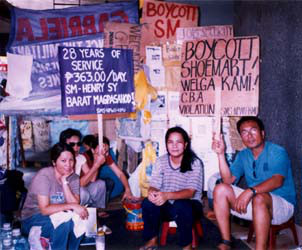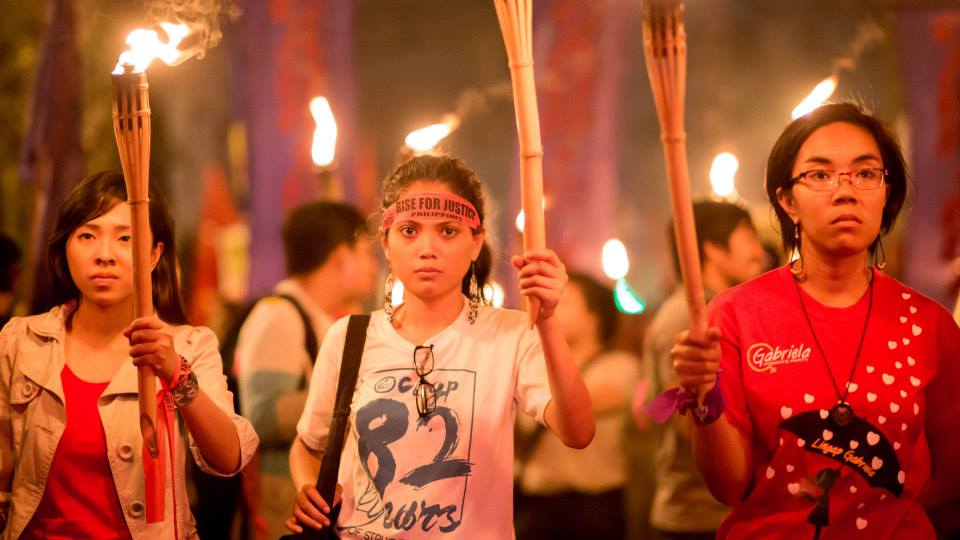A female model walk on fours as actor Coco Martin holds her on a leash as if she were his pet. Two male actors look on as two scantily clad women passionately kiss on stage.
These are but some of the scenes brought to you by Bench’s The Naked Truth Fashion Show.
It’s Not Rape, It’s A Snuggle With A Struggle’ are the words printed on T-shirts sold in the boys section of the SM Mall Department Store, the largest mall chain in the country owned by the richest man in the land.

These two incidents have sparked a prairie fire of indignation against SM and Bench for perpetuating ‘violence against women and children.’
The Facebook post by poet Karen Kunawicz which exposed the SM ‘rape shirt’ to the public has been shared almost 5,000 times and has earned almost 2,000 likes.
Clearly, to apologize for this as ‘art’ or to defend this in the name of the ‘freedom of expression’ or ‘sexual liberation’ is to legitimize the realities of violence and gender oppression that Filipina women go through every day.
In 2013 alone, the Philippine Commission on Women recorded 23, 865 reported crimes against women and children, including human trafficking, prostitution, white slavery, domestic abuse, abductions, and rape, which rose to 1,259 from 1,030 cases in 2012.
Fight Far From Over
That the two big corporations have become the targets of public outrage is a positive indicator of the rising consciousness on women’s rights.
“We will not allow this dehumanizing treatment of women in exchange for corporate profit and set back some of the victories we have achieved in the long struggle for the recognition of women’s rights,” said former Gabriela Women’s Party representative Liza L. Maza.

The Bench fashion show ‘clearly crossed the line,’ wrote Danah and Stacy of the site The Plump Pinay, who shared that the scene woman on a leash scene ‘made their blood boil’:
‘Didn’t anybody from the company know that treating people like dogs (literally) was one of the cruel exercises the Nazis did in concentration camps to strip a person from his/her dignity and humanity?’
But while Bench and SM may have issued apologies, with SM promising to withdraw the controversial T-shirt from their stocks, these incidents only shed light to a culture that perpetuates discrimination on women.

Commenting on the ‘rape shirt,’ Janine Dario, a lifestyle writer in the country said that this story sheds light on the ‘objectification of women for entertainment on TV, online photos, sexy dancers on noontime shows for public consumption, even minors.’
‘Now many young teens erroneously think they can be attractive only by showing off flesh,’ she lamented.
Not Just Cultural
But more importantly, these issues can serve as a springboard for calling into question a socio-economic system that has no qualms about selling ‘sexualized’ images to rake in profits.
From disgust over SM and Bench’s dehumanized representation of women, there must be a deep look [quote_right]In truth, more than 90 percent of Filipina women are workers and peasants. As peasants and farm workers, women in the countryside bear the brunt of landlessness, low wages, and usury, among others.[/quote_right]into the inhuman conditions of women as workers in factories, malls, call centers, export processing zones, and agricultural plantations — conditions that continue to disempower and marginalize women.
In truth, more than 90 percent of Filipina women are workers and peasants. As peasants and farm workers, women in the countryside bear the brunt of landlessness, low wages, and usury, among others.
Meanwhile, women workers who do not own any means of production are forced to sell their labor power to the capitalist in order to sustain themselves and their families. They create profits for the owners while suffering from low wages, inhumane work conditions, contractualization, and lack of benefits.
SM Malls, seller of the controversial rape shirt, for example, employs almost 40,000 workers of which 90 percent are contractual and 90 percent are women.
And yet, as a whole women are perceived as only secondary to men in the production process. They are tied to unwaged domestic work and are often given the entire responsibility of ensuring the care of the family’s needs. They are not free from discrimination and often receive lower wages, take lower positions, and lesser benefits than men.
Indeed, Filipina women are sought by many foreign companies as docile and cheap labor. Filipina workers are one of the country’s leading exports to the rich countries as domestic helpers, entertainers, mail-order brides, etc. More than half of the 5,000 Filipino who leave the country to look for work abroad are women.
The dehumanized portrayal of women at the point of consumption is hence at the same time reflective of the heartless exploitation of women at the point of production.
The consumerist and individualist cultures and lifestyles promoted by foreign multinational corporations and mass media that propagates the view of women as a marketable commodity is in fact an expression of the real commodification of women’s labor and bodies in the capitalist market.
The very visible eroticized portrayal of women and violence against them in the SM T-shirt, the Bench fashion show, the mass media, clothing, and everyday life goes side by side the super-exploitation of women which has for the most part become hidden in plain view.
Change the System
The naked truth on the discriminatory portrayal of women in the sphere of culture is the social reality of a ruling order lorded over by foreign monopoly capital and its local big comprador and big landlord cohorts, a system wherein the proliferation of these offensive images is but a symptom.
The sorry conditions in which Filipina women find themselves are the consequences of social structures of exploitation and oppression that burden the Filipino masses of workers, peasants, urban poor, youth, and other marginalized sectors.
This is a system that has meant the indirect control over the country’s economy, politics, and culture by U.S. imperialism, a foreign dominated, backward, and predominantly agrarian economy ruled by landed elites, and a government bureaucracy that has served as a milking cow for political dynasties.
[quote_center]Women liberation in this context can only be achieved through the collective action of women side by side with men for the overthrow this tottering system and its replacement with one that is genuinely democratic and free from foreign domination[/quote_center]

This is the very system now notorious for pork barrel and patronage politics, economic suffering for the poor majority, and human violations against critics — a system defended with all its might by the BS Aquino regime.
Women liberation in this context can only be achieved through the collective action of women side by side with men for the overthrow this tottering system and its replacement with one that is genuinely democratic and free from foreign domination.
Only thus can the conditions be set for the emancipation of women from all forms of violence, discrimination, exploitation, and oppression.































